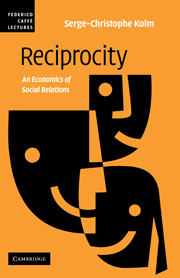Book contents
- Frontmatter
- Contents
- List of illustrations
- Foreword
- Introduction
- Part I Facts and forms
- Part II Motives
- Part III Values and reasons
- Part IV The economics of reciprocity
- 17 General methodology of reciprocity analysis
- 18 The theory of comparative, matching, or balance reciprocity
- 19 The theory of liking reciprocity
- 20 Strategic interaction and process preferences: games of reciprocity
- 21 General properties of processes
- 22 Solutions of reciprocity games; comparisons
- 23 Reciprocity in the understanding of society and its economy
- Bibliography
- Index
18 - The theory of comparative, matching, or balance reciprocity
Published online by Cambridge University Press: 22 September 2009
- Frontmatter
- Contents
- List of illustrations
- Foreword
- Introduction
- Part I Facts and forms
- Part II Motives
- Part III Values and reasons
- Part IV The economics of reciprocity
- 17 General methodology of reciprocity analysis
- 18 The theory of comparative, matching, or balance reciprocity
- 19 The theory of liking reciprocity
- 20 Strategic interaction and process preferences: games of reciprocity
- 21 General properties of processes
- 22 Solutions of reciprocity games; comparisons
- 23 Reciprocity in the understanding of society and its economy
- Bibliography
- Index
Summary
Reciprocitarian comparative sentiments
Reciprocity is motivated by comparison when the return-gift is elicited by sentiments based on a comparison between the gift and the return-gift. Such comparative reciprocity contrasts with liking reciprocity (although both are joined in a particular case, when the return giver wishes to show that she likes the other as much as she is liked by her).
Comparative reciprocities can involve various kinds of sentiments that elicit giving in return. The essential sentiment is the propriety of balancing the gift with some appropriate return gift. It has various different basic motives. Some of them focus on the overall situations, and others on the transfers (gifts). Some focus on one of the two agents, and others on both of them. Some refer to concepts or sentiments in the family of justice or fairness, whereas this is not the case for others. The sentiments or senses that can be involved are very varied: propriety, adequacy, fairness, justice, equity, equality, deserts, merit, moral indebtedness, shame, guilt, duty, or the requirement of a norm. These sentiments can be on the part of the initial receiver who gives in return, or of other people (including the initial giver). The initial receiver may care about these opinions and judgments of other people. Her decision to give in return can depend jointly on her own intrinsic judgment and on her view of other people's or society's judgments and opinions.
Information
- Type
- Chapter
- Information
- ReciprocityAn Economics of Social Relations, pp. 251 - 261Publisher: Cambridge University PressPrint publication year: 2008
